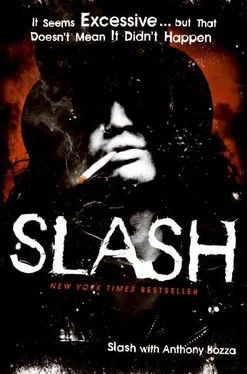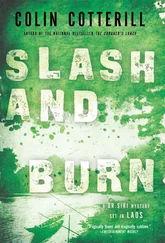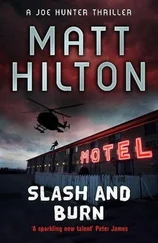AFTER I WAS DONE DOING MY GUITAR tracks, I vacated Studio B and Axl took it over and turned the entire Record Plant into a complex where his friends could hang out while he spent a few weeks finishing his vocals and adding the aforementioned synths. The rest of us weren’t too happy about that because every day that setup cost us a lot of money. It would have been fine if there was activity all day long, but none of us saw anything getting done on a consistent basis. In the end, Axl finished his work, but fuck, those two records cost a fortune to make—and I’m talking studio time alone.
This was when Axl started getting obsessive about the details of everything to do with Guns N’ Roses, starting with the publishing splits of the songs on Illusion I and II . The days of band members getting a straight 20 percent were long gone because there were so many outside writers this go-round, especially on the old songs that existed before Guns that were now in the equation, such as “Back Off Bitch.” We also had to factor in Matt, who wasn’t a full-fledged member: he hadn’t been around during the writing of the songs, though he’d played on all of them. In the end, because of contributors like Paul Huge and West Arkeen and Del James, Axl insisted upon splits that were like 22.75 percent or 32.2 percent per song for us core members. It was mathematically worked out according to who wrote what, which made it easy in the sense that we’d never have anything to fight over, but at the same time, it was pored over and complicated things to a corporate degree.
The songs we worked on in Chicago also posed a problem because those months there were so disjointed, and for the most part, Axl wasn’t even there, so the splits he devised for songs like “Garden of Eden,” “Don’t Damn Me,” and “Get in the Ring” were totally arbitrary; Duff and I wrote them instrumentally when Axl wasn’t even in the room. There were piano-driven songs with complex guitar parts that I’d had to write and arrange that I wasn’t even being given a songwriting credit. It was the same with “November Rain” and “Estranged,” to be specific. It concerned me, to say the least, but I chose to overlook it.
WHEN IT CAME TO GETTING THE ALBUM mixed, we had a decision to make. Thompson and Barbiero, who’d mixed Appetite, were no longer a team. The temperament of the band as we now were didn’t suit them, or their temperament didn’t suit us, I can’t remember which. We decided to hire Bob Clearmountain, a guy whose credentials spoke for themselves: he’d mixed everyone from the Kinks to Bowie to the Stones to Springsteen. We had a lot of material ready for him to start on while Axl continued to work on what wasn’t finished yet. Clearmountain came in and talked endlessly about Q Sound 5.1, a technology that was still in its formative stages. He was really into it, and I remember that he got Axl pretty excited about it, too. That was all great, but I wasn’t having it at all; Q Sound sounded like a wash to me. I didn’t care that Bob insisted that it was the future; to hear it properly required five speakers, and especially back then, in the early 1990s, most people had only two. And if you listened to something mixed in Q Sound through two speakers, it sounded like an indistinct mess. It was one of those much-hyped things that time proves to be nothing but a short-term, bridge technology: much like the minidisc, and the Laserdisc, Q Sound was a weak, impermanent version of what was to come.
That said, rather than make a big scene and get the whole band up in arms, which would have resulted in Axl and me arguing the pros and cons of Q Sound until we were blue in the face, I bit my lip and hoped that this would work out. And it did; Clearmountain shot himself in the foot almost immediately: one afternoon we discovered a notepad of his where he’d notated all of the drum samples he planned to mix in over Matt’s drum tracks. I’m not a drummer, so I can’t explain the technical ins and outs, but he’d brought in samples that would change Matt’s sound drastically. We showed it to Matt who had no idea and he wasn’t too pleased at all—and that was the excuse we needed to fire Bob Clearmountain.
We ended up hiring Bill Price to mix. We respected Bill’s résumé, to say the least: he’d mixed the first Pretenders record, the Sex Pistols’ Never Mind the Bollocks, and as far as I was concerned, that was all that I needed to know to sign off on him. Bill worked out of a studio in Larchmont, California, and I made it my personal mission to be there every day, watching him work, contributing where I could, and ensuring that the mixes he did each day were sent out to Axl’s house in Malibu immediately.
It was a long, tedious process: I’d show up in the early afternoon and listen to the mix that Bill would have up. Once it was at a place where I was satisfied with it, we’d make a tape of it and send it to Axl. We’d hang around the studio or start working on the next song while the messenger got it there. When he did, I must say, Axl wasted no time in listening to the tape and calling in with his comments, which were usually very helpful. We’d then make whatever adjustments needed to be made, mix it down again, and send another copy out to him. And so on, song by song. It took forever to get them all just right, but it was worth it.
DURING THIS PROCESS, THE ANIMOSITY between our manager, Alan Niven, and Axl came to a head. The rest of us had been trying to squash it for a while, but Axl’s issues with Alan had been brewing for years—since the moment he found out that Alan also managed and produced and cowrote Great White. There was also the fact that Alan was opinionated about a lot of things and Axl didn’t always agree with his point of view. So at times Axl felt like he was being forced to do things that he didn’t necessarily want to do. Axl thought that Alan had developed an ego, that he’d gone from a Malcolm McClaren to a Peter Grant. And really, Alan’s ego was as inflated as ours.
I had been Alan’s champion, however, until one incident swayed me against him. One night when Renee and I were at his house with him and his wife, Camilla, Alan said something really inappropriate to Renee. I don’t remember what it was exactly, but it was creepy enough that we left immediately. I never forgot it, and I won’t repeat it here. As much as I loved Alan for what he’d done to help us, I didn’t protest too much when Axl moved to oust him. I knew it was going to happen but I didn’t think it would be the tipping point. Looking back, I feel that shift was the moment, the pause at the pinnacle of the band’s success… and the start of its downfall.
All the same, I saw Doug coming. He had made a place for himself in Axl’s life, and once Axl had made his feelings about Alan clear, I don’t think it’s a coincidence that Doug was right there to pick up the reins. He had been strategically moving up the ladder from the beginning. He was like an ambush predator. Though at the end of the day no one is more responsible for the demise of Guns N’ Roses than Guns N’ Roses, Doug Goldstein was a catalyst. His divide-and-conquer techniques were instrumental in achieving our end.
If you run down the history of the demise of great rock bands, more often than not you’ll discover that many of them dumped their original manager on their way to grasping the brass ring, and once they did, it all got fucked up. I’m kind of pissed off that we followed that tradition.
As self-destructive as we may or may not have been, and despite the communication barriers between the members, we had the desire to play music and move forward at all costs. That an outside influence completely disrupted the band really is a shame.
It was a dream come true… but as we prepared for our monster tour, the last thing on our minds was being careful what we wished for.
Читать дальше
Конец ознакомительного отрывка
Купить книгу




![Сол Слэш Хадсон - Slash. Демоны рок-н-ролла в моей голове [litres]](/books/387912/sol-slesh-hadson-slash-demony-rok-n-thumb.webp)


